In a small area of Ximending bounded by cinemas, the Danshui River and a strip of karaoke bars and hotels, are lanes and alleys that cater to hip-hop crews and consumers of Asian fashion. It is a lively section of Taipei, with rehearsal spaces for bands and film workshops, mixed with vendors and by-the-hour hotels. There are hundreds of places to eat and all-night cafes.
Taking a stroll and probably getting lost is not a bad way to kill some time if it involves lunch or dinner and a break for coffee. On the way you'll see a hoard of graffiti. It's not unlike taking a stroll through a contemporary art gallery's exhibition of ghetto artists. Among the prominent artists, there is the sublime Arnold -- who is rumored to be doing his military service -- and Ragdoll. Tags are in Chinese and English. The boom-box greetings of the competing storeowners are the rhythm of the streets, with a half-abandoned car spray-painted with the terse statement: Fuck Nike.
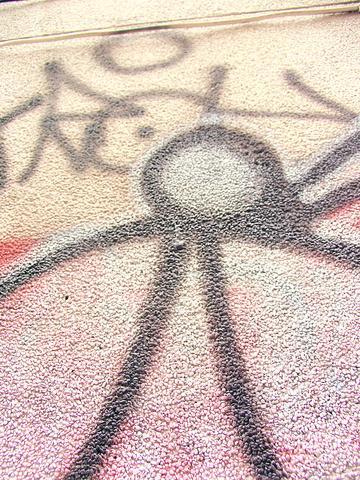
PHOTO: JULES QUARTLY, TAIPEI TIMES
Though papers reported gangland street fights over drugs a few years back, Ximending is now heavily patrolled and has a lot of closed circuit TV cameras mounted on streetlamps.
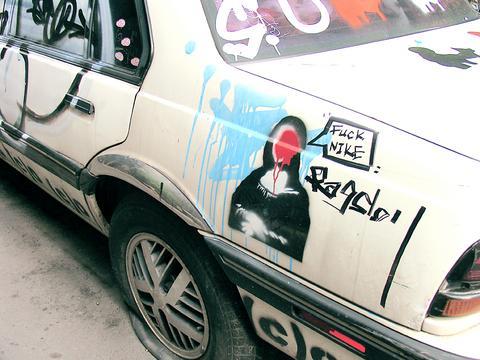
PHOTO: JULES QUARTLY, TAIPEI TIMES
It feels like a peaceful, sub-tropical urban jungle. At night there are 24-hour tea and coffee houses, bowling alleys, PC game places and arcades. There are a few nightclubs and many karaoke and red-envelope bars (so called because men pay for a song with a red envelope containing money). At dawn, the clientele and hostesses from the piano bars on Chengdu Road spill out into the street and toward the line of yellow taxis.
Originally a public burial ground when it was first developed in 1885, Ximending's name derives from being one of the five gates of Taipei. It was an entertainment district developed by the Japanese in the first half of the century and flourished in the1950s and 1960s, when it first became a fashionable hotspot for the prospering Chinese Nationalist Party soldiers and locals.

PHOTO: JULES QUARTLY, TAIPEI TIMES
Japan is back now, at least when it comes to fashion. Young women wear minutely planned and accessorized looks inspired by manga comic characters. They wear shorts and layers of long colorful socks with flat sandals or boots. The guys are a mixed bunch of shorts, cargo pants, baggy jeans, extra-large clothing, hats and shades.
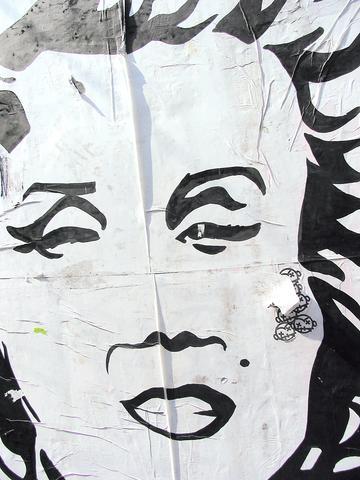
PHOTO: JULES QUARTLY, TAIPEI TIMES
Ohtomo (大
Mao (毛
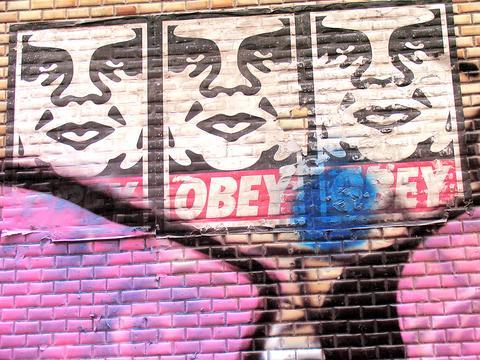
PHOTO: JULES QUARTLY, TAIPEI TIMES
They both say business is good.
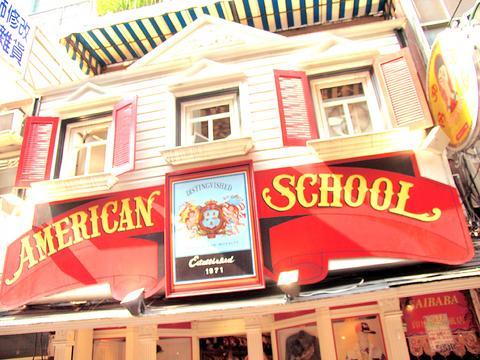
PHOTO: JULES QUARTLY, TAIPEI TIMES
At Doobiest, on Wuchang Street, many of the clothes and accessories are from the US, with labels like Tribal USA and Dickies. The Denon turntables are prominently displayed, but a CD plays in the background. XXXL shirts and pants are being sold to the guys, hot pants for the ladies. There is an Apple computer and 12-inch records. At another hip-hop store nearby, kids admire a custom-made low-rider bike with high handlebars and chrome accessories.
Down on Emei Street are some large works of graffiti, more stores with names like Pinky, Mother Fucker, K.O.S (king of the streets) and Vicious. They aim for the broad spectrum of punk-death metal combinations, soul, R 'n' B and US skateboarder styles. A little further and the hip-hop boutiques make way for hotels, karaoke parlors and all-night fried rice and noodle diners that always seem to have a little sashimi and a lot of Taiwan Beer.

One of the biggest sore spots in Taiwan’s historical friendship with the US came in 1979 when US president Jimmy Carter broke off formal diplomatic relations with Taiwan’s Republic of China (ROC) government so that the US could establish relations with the People’s Republic of China (PRC). Taiwan’s derecognition came purely at China’s insistence, and the US took the deal. Retired American diplomat John Tkacik, who for almost decade surrounding that schism, from 1974 to 1982, worked in embassies in Taipei and Beijing and at the Taiwan Desk in Washington DC, recently argued in the Taipei Times that “President Carter’s derecognition

This year will go down in the history books. Taiwan faces enormous turmoil and uncertainty in the coming months. Which political parties are in a good position to handle big changes? All of the main parties are beset with challenges. Taking stock, this column examined the Taiwan People’s Party (TPP) (“Huang Kuo-chang’s choking the life out of the TPP,” May 28, page 12), the Democratic Progressive Party (DPP) (“Challenges amid choppy waters for the DPP,” June 14, page 12) and the Chinese Nationalist Party (KMT) (“KMT struggles to seize opportunities as ‘interesting times’ loom,” June 20, page 11). Times like these can

Dr. Y. Tony Yang, Associate Dean of Health Policy and Population Science at George Washington University, argued last week in a piece for the Taipei Times about former president Ma Ying-jeou (馬英九) leading a student delegation to the People’s Republic of China (PRC) that, “The real question is not whether Ma’s visit helps or hurts Taiwan — it is why Taiwan lacks a sophisticated, multi-track approach to one of the most complex geopolitical relationships in the world” (“Ma’s Visit, DPP’s Blind Spot,” June 18, page 8). Yang contends that the Democratic Progressive Party (DPP) has a blind spot: “By treating any

You can tell a lot about a generation from the contents of their cool box: nowadays the barbecue ice bucket is likely to be filled with hard seltzers, non-alcoholic beers and fluorescent BuzzBallz — a particular favorite among Gen Z. Two decades ago, it was WKD, Bacardi Breezers and the odd Smirnoff Ice bobbing in a puddle of melted ice. And while nostalgia may have brought back some alcopops, the new wave of ready-to-drink (RTD) options look and taste noticeably different. It is not just the drinks that have changed, but drinking habits too, driven in part by more health-conscious consumers and